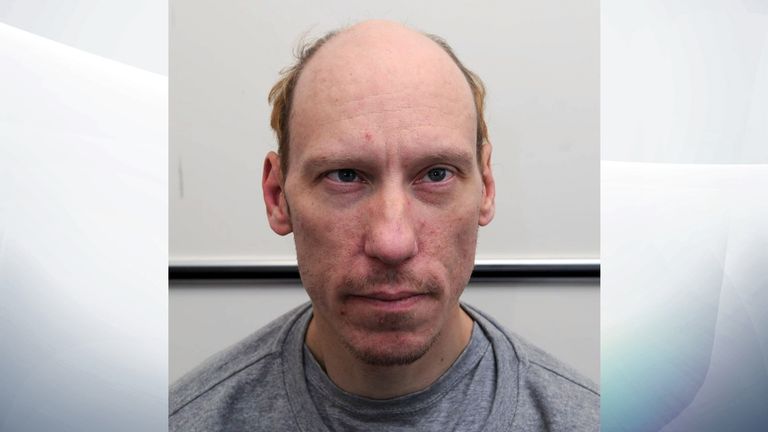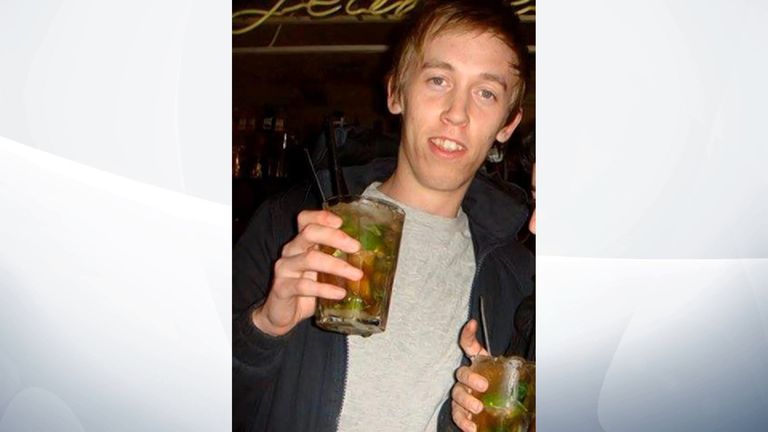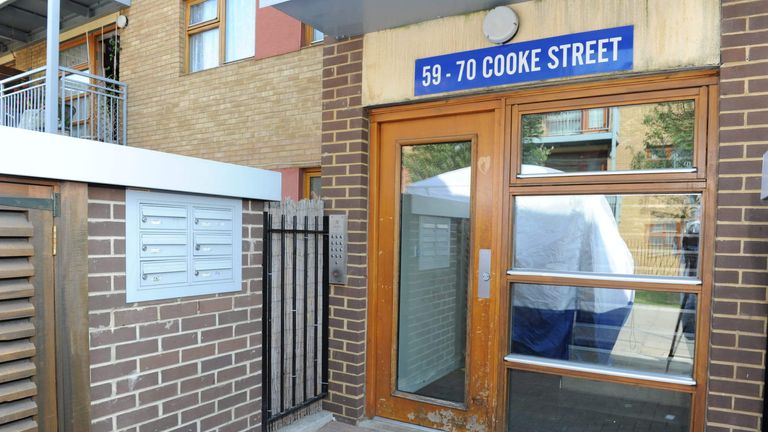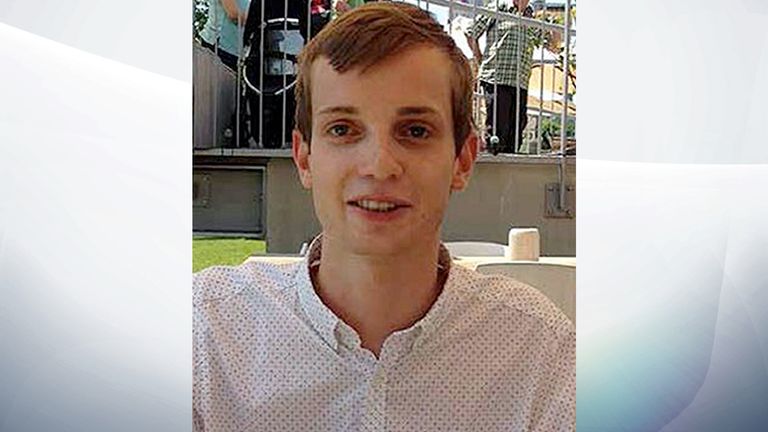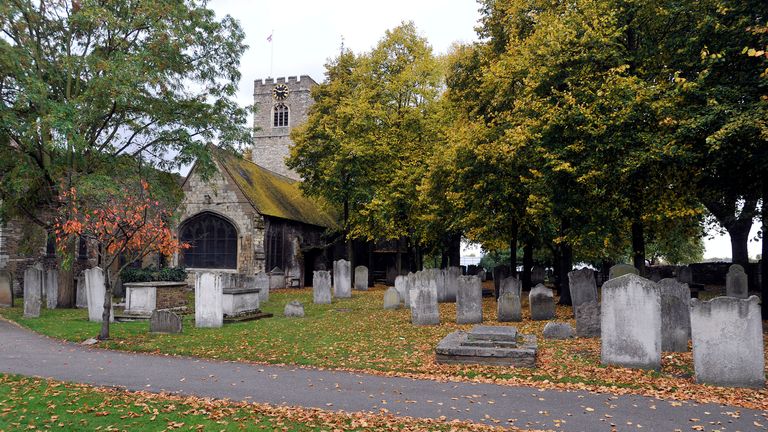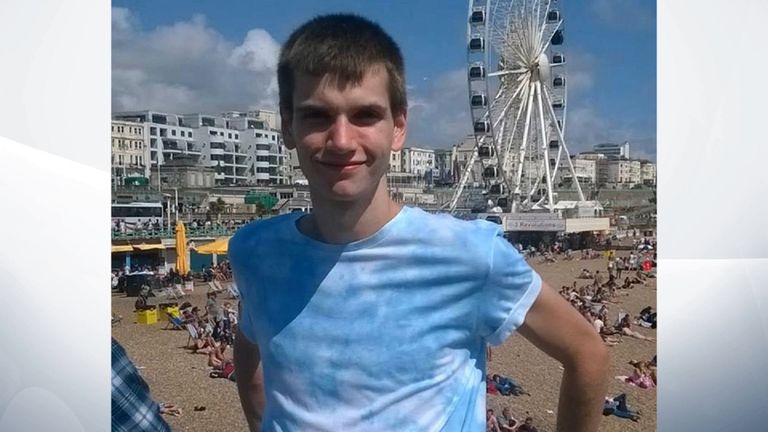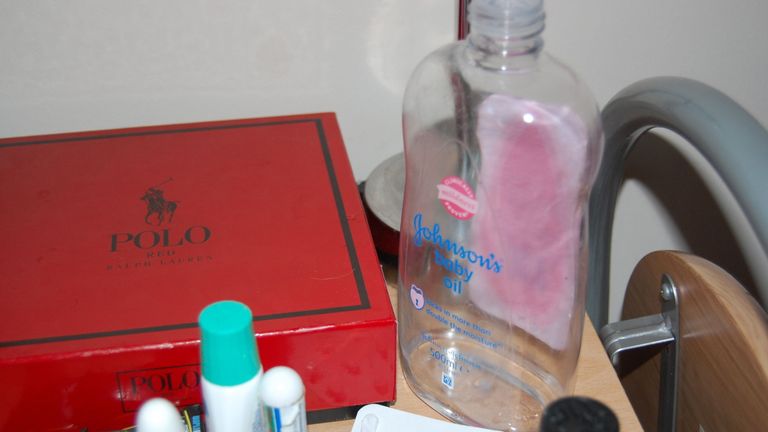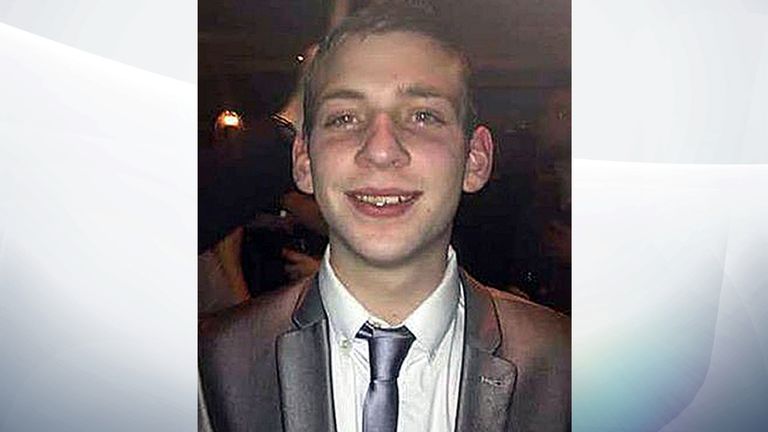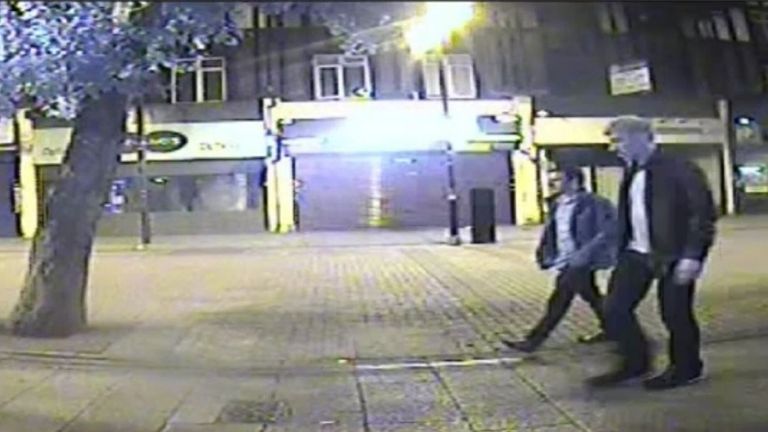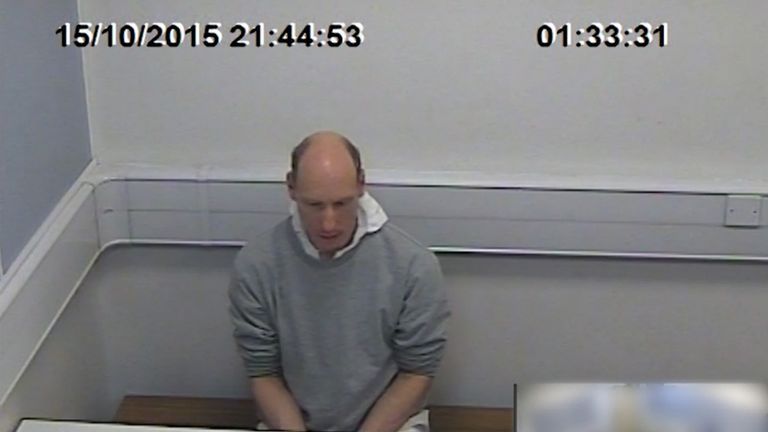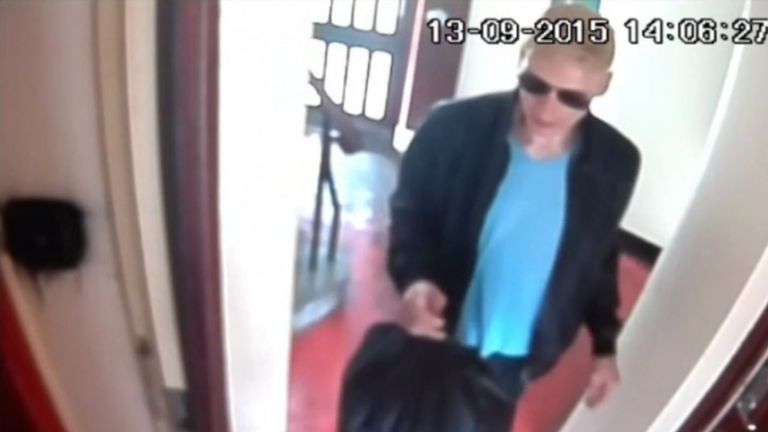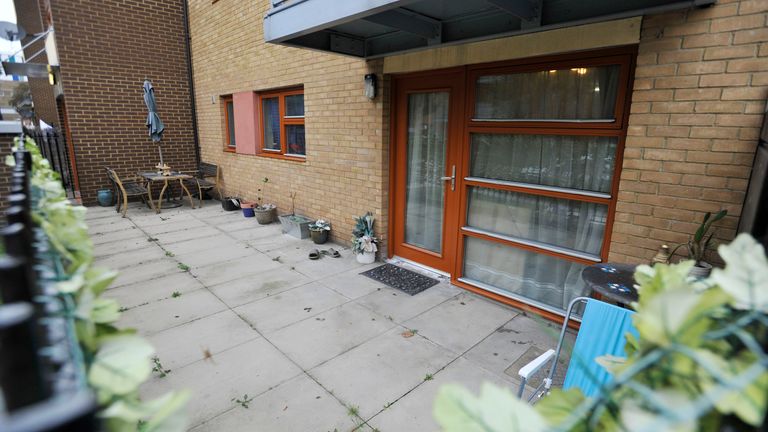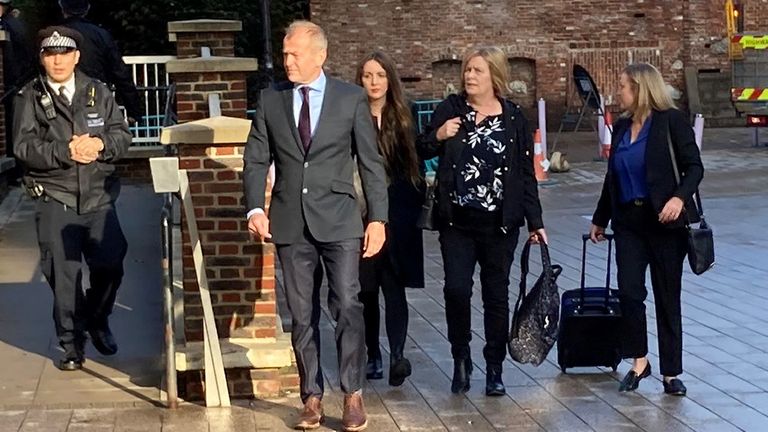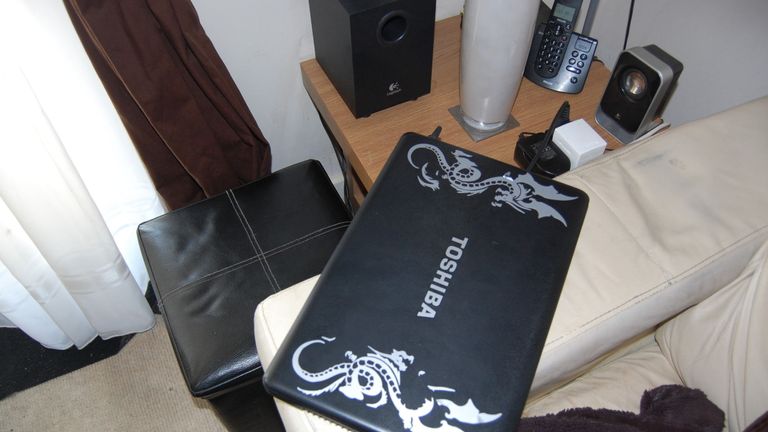Stephen Port: Who is the ‘Grindr killer’ and what happened to his victims?
More than seven years after Stephen Port committed murder for the first time, an inquest has begun into the deaths of his four victims.
Port, 46, is one of just 60 prisoners in the UK serving a whole-life sentence, which means he will die behind bars.
Between June 2014 and September 2015, the former chef lured four young men to his flat in Barking, east London, plied them with drugs, raped and murdered them.
Police initially failed to make any connection between the deaths, with the Met forced to apologise to the victims’ families and several officers investigated for gross misconduct over alleged failings in trying to catch Port before he killed again.
The inquest, is taking place just yards away from where he carried out his crimes. It will last around 10 weeks and examine whether his victims’ deaths were preventable.
Here Sky News looks back at what we know already.
Stephen Port
Port, 46, was given a whole-life prison sentence on 25 November 2016.
In court, he denied all 22 charges against him, but was found guilty of the murders of Anthony Walgate, 23, Jack Taylor, 25, Daniel Whitworth, 21, and Gabriel Kovari, 22.
Port, also known as ‘The Grindr Killer’ for the way he scouted his victims, was also convicted of four rapes, four sexual assaults and 10 counts of administering a substance in relation to seven other men.
He was cleared of three other counts of rape.
Port is behind bars at HMP Belmarsh in south London.
He was born in Southend, Essex in 1975, before his parents moved to Dagenham, east London.
His father worked as a cleaner for Barking and Dagenham Council and his mother worked at a supermarket checkout.
Port went to art school at 16, but his family were unable to afford his studies, so he changed direction and trained as a chef for two years instead. He came out as gay in his mid-twenties.
He worked in catering at various places in his local area and was working as a chef for Stagecoach at their bus depot in West Ham when he committed his crimes.
Port moved to his own flat in Cooke Street, Barking in 2006.
Men he had been in relationships with before the murders told police he regularly used the party drug GHB, which is often referred to as a ‘date rape’ drug.
Searches of his computer also revealed he regularly watched ‘drug rape’ pornography.
Previous partners told investigators he would regularly cheat on them, work as a male escort or act as their pimp.
He used dating sites to meet men who were younger than him.
At the age of 32, Port had a two-year relationship with a 16-year-old boy.
Anthony Walgate
Anthony Walgate was 23 when he was found dead outside Stephen Port’s block of flats in the early hours of 19 June 2014.
He was studying fashion at Middlesex University and living in rented accommodation in Golders Green, 17 miles away from Barking, in north London.
Living away from his family home in Hull, he occasionally worked as an escort through a website called Sleepyboys to earn some extra money.
It was there he was contacted by Port, who offered him £800 for an overnight job.
Mr Walgate told a friend he had received an escort booking in Barking, but was not convinced it was genuine, so gave them the details “in case I get killed”.
He also told the friend he was going to take a pair of scissors with him should he need to defend himself.
Nobody heard anything from Mr Walgate until Port called an ambulance at 4.18am claiming: “There’s a young boy, looks like he’s collapsed outside… he could have had a seizure or something, or just drunk.”
When paramedics arrived along with the police they found Mr Walgate slumped against a wall outside Port’s apartment block in Cooke Street – dead.
He had a black bag next to him with a bottle of liquid inside, but no mobile phone.
Port told police he had come back from a night shift at around 4am to find a man “lying in front of my door”.
He claimed to have tried to wake him up by slapping him in the face, but when that failed he called an ambulance and left him outside.
A week later, police discovered Mr Walgate had worked as an escort, and Port had accessed his profile and arranged to meet up with him.
They arrested him on 26 June on suspicion of perverting the course of justice after he lied about discovering him out of the blue.
Port changed his story, admitting he found Mr Walgate online and met up with him in the middle of the night at Barking station.
He claimed his victim had taken drugs from a bottle and they had sex twice, but when Mr Walgate was about to leave, he had become very tired, so he stayed the night.
Port left for work before Mr Walgate woke up, he told detectives, and came back to find him still sleeping.
He claimed he got into bed with him but started to panic at around 3am when he realised he was “rigid”.
Port said he dragged him outside his flat for fear of people thinking he might have been responsible for his death.
He was bailed and it wasn’t until 15 January the following year that he was charged.
Pleading guilty at Snaresbrook Crown Court in February, he was sentenced to eight months in prison.
He only served four months and was released in June 2015.
Port was not investigated on suspicion of murdering Mr Walgate – as police had not searched his computer despite seizing it after his arrest.
Mr Walgate’s death was instead put down to a fatal GHB overdose after the drug was found in blood and urine samples.
Gabriel Kovari
Gabriel Kovari was Port’s second murder victim.
His body was found in the graveyard at St Margaret’s Church in Barking – 0.2 miles away from Port’s flat – on 28 August 2014.
At this point, Port was out on bail having been arrested on suspicion of perverting the course of justice over the lies he told police about Anthony Walgate’s death.
Mr Kovari, 22, was originally from Slovakia, but had been living in Spain with his boyfriend Thierry Amodio, before he decided to move to London in mid-2014.
Originally he lived with a man he met on a gay dating website in south London.
But he was keen to move and in August he said he had found a place to stay in Barking.
Mr Kovari moved into Port’s Cooke Street flat on 23 August.
The 22-year-old had told friends Port seemed strange and that he was not attracted to him, but he was not going to charge him rent for staying on the sofa, so he was happy to live there.
But after meeting one of his Port’s neighbours the day after he moved in, Mr Kovari text him to say “Stephen is not a nice person”.
The neighbour texted Port to ask how Mr Kovari was doing, but he replied that he had “gone to stay with some soldier guy he had been chatting to online”.
On 27 August, Port rang his sister Sharon to say there was a dead body in his bedroom.
She told him to go to the police, but 24 hours later Mr Kovari’s body was found slumped against a wall in the graveyard near Port’s flat.
His midriff was exposed, as Mr Walgate’s had been. But Port was not questioned over Mr Kovari’s death.
Instead he found his boyfriend on Facebook and pretended to be a 21-year-old gay porn star from California called Jon Luck in order to get information about the police investigation.
Daniel Whitworth
Three weeks after she found Gabriel Kovari’s body in the Barking churchyard, on 20 September 2014 local dogwalker Barbara Denham found another in the same place.
It turned out to be Port’s third murder victim, 21-year-old Daniel Whitworth.
Mr Whitworth was in a relationship with his partner Ricky Waumsley and they lived together in Gravesend, Kent, having met on a gay dating site.
He was a chef and worked at up-market locations in London such as One Moorgate Place and Canary Warf.
Mr Whitworth was signed up to another dating site at the time called Fitlads and began talking to Port on there on 18 August.
They didn’t meet until a month later.
On 19 September when he failed to turn up for work, Mr Whitworth’s boyfriend reported him missing.
Port was later found to have deleted his Fitlads profile that day.
When Mr Whitworth’s body was found, it was accompanied by a fake suicide note, written by Port.
It said he had killed himself out of guilt because he had been taking GHB with Gabriel Kovari when he “didn’t notice while we was having sex that he stopped breathing”.
The note added: “BTW Please do not blame the guy I was with last night, we only had sex then I left, he knows nothing of what I have done.”
The fake note said he had overdosed on sleeping pills and GHB, which were both found in his system during post-mortem examinations.
Police appeared to believe the note and neither death was treated as suspicious. Their inquests recorded open verdicts.
Jack Taylor
Jack Taylor, 25, was a forklift truck driver from Dagenham, east London.
He was Port’s final victim. His body was found on 15 September 2015 – two months after Port had been released from prison for perverting the course of justice.
Mr Taylor lived at home with his parents and he had two sisters. He was not thought to be openly gay and had a number of girlfriends in the past.
Three days before he was found dead, he went out drinking at the Trading Club in Dagenham.
When he got back in the early hours of 13 September, his father was still awake and wished him goodnight.
But soon after that he had gone back out in a taxi after matching with Port on the app Grindr.
Phone records show Port had asked his victim if he had “ever taken T”, referring to crystal meth.
CCTV captured Port and Mr Taylor meeting at Barking station in the middle of the night.
They walked to Port’s flat, where police believe he died shortly after.
Before his body was found without a mobile phone – in similar circumstances to Anthony Walgate – Port deleted his Grindr account.
Mr Taylor was discovered in the same spot in the church graveyard as Gabriel Kovari and Daniel Whitworth, but police made no link and put the death down to a drug overdose.
His family refused to accept this story and pursed their own inquiries.
After putting pressure on police, detectives revealed they had CCTV of Mr Taylor in the hours before he died.
Eventually the Met issued one of the CCTV images, which showed him walking near Barking station with a tall man.
Although several members of the public called about the picture, it was a local police officer in Barking and Dagenham that recognised Port from previous inquiries.
Finally on 15 October 2015, Port was arrested on suspicion of causing the deaths of all four of his victims by administering poison.
Other victims
After a four-day police interview, searches of his home, phone and laptop, Port was charged with four counts of murder on 18 October.
The charge was reported in the media, which caused eight other men to come forward with stories they had been drugged and raped by Port at his flat after finding him online.
All the men claimed to have had similar experiences.
They said Port had either spiked their drinks or injected them with drugs without them knowing.
One man, a teenage student, told his trial he met Port on Grindr at the beginning of 2012.
The pair met at Barking station and went back to Cooke Street.
At Port’s flat, the man said he put on a film and offered him a glass of red wine.
He noticed it “tasted bitter” and there was “sludge at the bottom of the glass”.
This turned out to be GHB, which made the man fall asleep. He awoke to Port raping him.
The drugs were so strong, he fell unconscious again minutes later.
In the morning, he said Port acted like nothing had happened and was too scared to tell anyone about it.
Another man, this time a Muslim one in his twenties, said he met Port five times after they matched on the website Fitlads in mid-2014.
On the fifth meeting, Port offered him poppers, a legal party drug often used during sex.
The man did not drink alcohol or take drugs, so they caused him to fall asleep.
He claims Port offered him a glass of water when he woke up, which made him pass out again.
The man awoke to find he was not wearing underwear and began shouting and screaming.
Port took him to Barking station where the man was still in visible distress.
British Transport Police on duty at the station called an ambulance, which made Port fearful he’d be caught.
But the man was too scared to report the incident to police, as his parents were not aware of his sexuality.
Police failings
There have been allegations of multiple police failings to catch Port before he committed further crimes.
And LGBTQ rights organisations have accused the Met of failing to investigate his victims’ deaths because of their sexuality.
Swearing in jurors for their inquests at Barking town hall on 5 October, Sarah Munro, assistant coroner for east London, said: “The trial did not answer the important question of whether the deaths of Anthony Walgate, Gabriel Kovari, Daniel Whitworth and Jack Taylor might have been prevented.
“If there appear to have been shortcomings in the way in which the police investigated these deaths, we must consider those shortcomings dispassionately and resist the temptation to look for scapegoats.”
The Met were forced to apologise to the families of the four men following Port’s trial.
As the inquest opened, Commander Jon Savell, head of profession for investigations, said: “Our thoughts are firstly with the family and friends of those murdered by Stephen Port.
“We are offering every assistance to the coroner and welcome a full examination of all the facts surrounding the tragic deaths of these four young men.
“At the time of Port’s conviction, we apologised to the victims’ families and Daniel Whitworth’s partner for how we initially responded to the deaths, and I would like to apologise again.
“Since Port’s offences came to light we have worked hard within the Met to improve both our processes and our wider knowledge across the organisation of a range of issues associated with the murders.”
The families have launched civil action against the force and 17 officers are being investigated by the Independent Office for Police Conduct (IOPC) over alleged misconduct.
After Port’s sentencing, the Met said it was re-investigating 58 unexplained deaths that involved date rape drugs.
A spokesperson added: “Work since Port’s offences came to light includes adopting an MPS-wide written protocol for minimum standards of investigation for unexplained deaths.
“There has been extra training for our officers on how drugs can be used as a weapon by offenders to facilitate rape and sexual assault, as well as on issues that impact on the confidence of our LGBT+ communities.”
Source: Read Full Article
